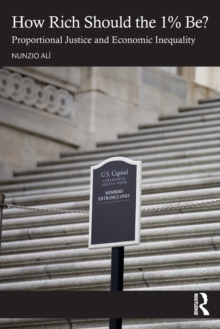Description
| Product ID: | 9781032038643 |
| Product Form: | Paperback / softback |
| Country of Manufacture: | GB |
| Title: | How Rich Should the 1% Be? |
| Subtitle: | Proportional Justice and Economic Inequality |
| Authors: | Author: Nunzio Ali |
| Page Count: | 198 |
| Subjects: | Development studies, Development studies, Social and political philosophy, Society and culture: general, Sociology, Social work, Political science and theory, Economic theory and philosophy, Political economy, Health, Relationships and Personal development, Social & political philosophy, Society & culture: general, Sociology, Social work, Political science & theory, Economic theory & philosophy, Political economy, Health & personal development |
| Description: | Select Guide Rating This volume explores how excessive economic inequality gives the best-off considerably more political influence than average citizens, thereby violating political equality. How rich should the 1% be? And, most importantly, when does the distance in economic resources between the richest citizens and ‘us’, the average citizenry, become a concern for justice? This volume explores how excessive economic inequality gives the best-off considerably more political influence than average citizens, thereby violating political equality. It argues that the gap between the best-off and the worst-off should not be reduced because it is good, but rather as an inescapable instrument to protect citizens from the risk of material domination. For this reason, it defends the ‘principle of proportionality’: economic inequality should not exceed a certain range or proportion to enable both the best-off and the worst-off to be co-authors of the legal, political, and socioeconomic rules that govern the ‘social’ relations in which they are involved. Further, the book discusses material domination and explains how money influences politics and what are the remedies for this phenomenon; how social justice should face and harmonise power, poverty, efficiency, individual merit, and economic liberties; and, most importantly, how to determine income and wealth limit ratios in a liberal democracy. A thoughtful investigation on the interdependencies of money and justice and their influence our socio-political systems, this volume will be of great interest to students and researchers of political theory, political philosophy, economics and development, economics theory and philosophy, and social policy. |
| Imprint Name: | Routledge India |
| Publisher Name: | Taylor & Francis Ltd |
| Country of Publication: | GB |
| Publishing Date: | 2022-11-11 |


